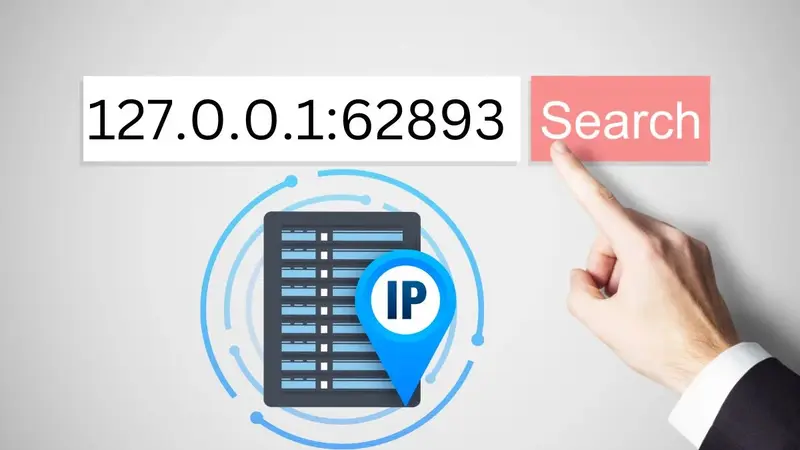Explore 127.0.0.1:62893 a key localhost address and port for internal testing and development. This setup helps manage and debug applications locally, ensuring efficient and secure operation.
What is 127.0.0.1?
127.0.0.1, often referred to as “localhost,” is a special IP address that directs network traffic back to your machine. This address is reserved for use in testing and development, allowing applications to communicate internally without needing access to external networks. It serves as a fundamental tool for developers to simulate network interactions on their local system.
Ports and Their Functions
In networking, a port acts as a communication channel for applications and services. Ports are identified by numbers ranging from 0 to 65535, with each port representing a specific endpoint on a machine. For example, a port 62893 is part of the dynamic port range and is often used for custom or temporary services, providing flexibility for various applications and tasks.
How 127.0.0.1:62893 Operates
When you connect to 127.0.0.1:62893, you are accessing a specific service or application running on your local machine at that port. This loopback setup routes the data back to the same computer, making it ideal for testing and debugging without interacting with external networks. For example, a web server running on this address and port allows developers to view and test their web applications locally.
The Significance of Localhost Addresses
Localhost addresses like 127.0.0.1 are crucial for internal testing and development. They provide a controlled environment where developers can test applications and services without affecting live systems or external users. This isolation helps ensure that software functions correctly before deployment, making it a vital tool in the development process.
Uses of 127.0.0.1:62893
- Web Development: Developers use
127.0.0.1:62893to test web applications locally. This setup allows them to make changes and see results in real time without deploying to a public server. - Database Management: Database administrators use this address and port to run local database servers, test queries, and make configurations without impacting live databases.
- Network Troubleshooting: System administrators use local host addresses for diagnosing and fixing network issues without affecting production environments.
Security Considerations
Despite being an internal address, 127.0.0.1:62893 can still pose security risks if not properly managed. It’s important to configure firewalls and secure services to prevent unauthorized access. Even though the loopback address doesn’t expose itself to external networks, implementing proper security measures can protect against potential vulnerabilities.
Common Misunderstandings
- Localhost vs. Public IP:
127.0.0.1cannot be used to access external resources or replace a public IP address. It is intended solely for local testing and internal communication. - Scope of Use: While often used for testing,
127.0.0.1is a fundamental part of how networked applications communicate within the same machine, not just for development.
Setting Up a Web Server Locally
To test a web application using 127.0.0.1:62893, follow these steps:
- Install Server Software: Choose a server application like Apache or Node.js.
- Configure: Set the server to listen on
127.0.0.1and port62893. - Start and Test: Access the server by navigating to
http://127.0.0.1:62893in a web browser to test its functionality.
Using Networking Tools
Tools like ping, telnet, and netstat can interact with 127.0.0.1:62893 for diagnostics. These tools help verify connectivity and troubleshoot issues within the local network environment, making the loopback address a valuable asset for network administrators.
Debugging with Localhost
Debugging issues with 127.0.0.1:62893 can be challenging due to potential configuration errors or port conflicts. Effective debugging involves checking server configurations, and firewall rules, and reviewing logs to identify and resolve issues.
Virtualization and Localhost
In virtualized environments, each virtual machine has its loopback address, often using the 127.0.0.1 range. This setup allows VMs to communicate internally and with the host system, facilitating network management and configuration within virtualized environments.
The Evolution of Localhost Addresses
Over time, localhost addresses have evolved from simple tools to essential components in modern development practices. Advances in networking, including IPv6, have enhanced the functionality of loopback addresses, ensuring compatibility and efficiency in evolving network architectures.
Conclusion
The combination of 127.0.0.1:62893 is a cornerstone of local network communication, providing developers and administrators with a powerful tool for testing, development, and troubleshooting. Understanding how to effectively use and manage local host addresses is essential for maintaining efficient and secure network operations. By leveraging 127.0.0.1:62893 you can streamline development processes, enhance security, and ensure the reliability of your applications. If you have any questions, please visit the Kaz World Mag.

